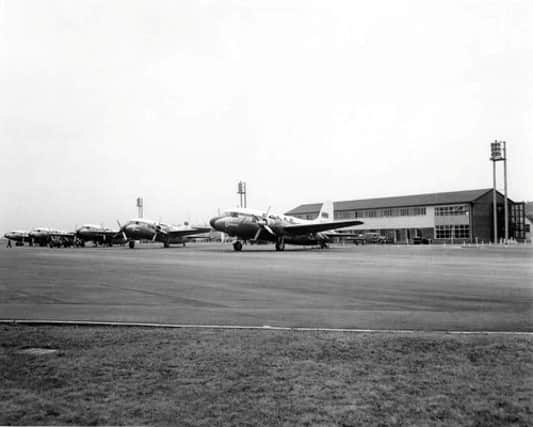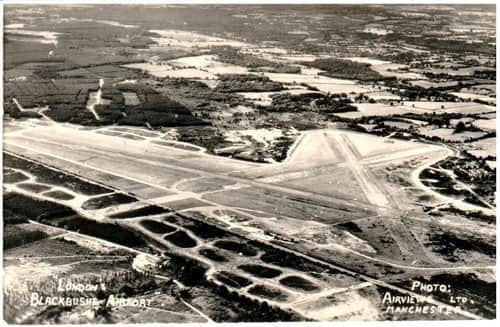World War II airbase Blackbushe Airport in Hampshire saved after battle to protect 600 year old common land


A battle to protect 600-year-old common land on which a Second World War airbase sits has finally been won by campaigners after a seven-year legal fight. After appealing against a previous judgment Blackbushe Airport in Hampshire has had its final bid to deregister 46 hectares of land to built on rejected.
Once earmarked to be London's second airport after Heathrow, they claimed the land on Yateley Common was 'curtilage' of the site. The small airport was built during WWII and bomber squadrons took off from the base dropping smoke screens on the Normandy coastline to stop the Germans from spotting the incoming Allied invasion on D-Day.
Advertisement
Hide AdAdvertisement
Hide AdWhen the plot was de-requisitioned in 1960, war hero Air Vice Marshal Donald Bennett, leader of the famed "Pathfinder Force," bought it up and reopened the site as a private airfield. Civil aviation has operated there ever since, even though the land was due to be returned to the surrounding common after the war.
The airport applied to the council to deregister the 500 hectare Yateley Common in 2016, which has been common land since the 13th century. Much of the Common is a designated Site of Special Scientific Interest and a Special Protection Area (SPA) because of the wildlife living there.


Blackbushe Airport Ltd (BAL) now operates training and business flights from the historical site and its manager wanted to modernise the spot to turn around its finances. The company, led by Cameron Ogden, the son of tycoon and Computacenter founder Sir Peter Ogden, said they wished to develop the airport, into a “centre of aviation excellence” where small start-ups and existing businesses can “thrive.”
Hampshire County Council and Open Spaces Society, Britain's leading activism group for common land, defended the Common in court. They won their case in 2020 but the airport appealed the decision which it lost and the application was sent back to be redetermined.
Advertisement
Hide AdAdvertisement
Hide AdNow the original application has been rejected by the government inspector which means the matter is now closed. He found in favour of the developers only in the deregistration of the cafe and terminal building which take up 500m² or just 0.1 per cent of what was sought to be deregistered in the 2016 application.
The society’s case officer for commons, Hugh Craddock, said: ‘We are pleased that the inspector finally has closed the door to deregistration of common land at Blackbushe without provision of compensatory land. Six years ago, commenting on BAL’s application, I said that it was a cynical attempt to reverse, once and for all, the recognition that the aerodrome is rightly part of the common. We said then that we would fight the application and we did.
"As long ago as 1976, the High Court decided that the airfield rightly was part of Yateley common, and should be registered as such. We challenged the application through a public inquiry, following which another inspector (now retired) shamefully agreed with BAL’s absurd proposition that nearly half a square kilometre of the aerodrome was the curtilage of the terminal building.
"I said then that Blackbushe Aerodrome is no more curtilage of the terminal building than Victoria station is curtilage of the signal box. We appeared alongside Hampshire County Council to challenge the decision, and the High Court agreed with us and ordered the decision to be quashed.
Advertisement
Hide AdAdvertisement
Hide Ad"BAL appealed, but the court of appeal upheld the quashing order. Now, an inspector has redetermined the application and done what we said should have been done many years ago, found that only the two buildings are eligible for deregistration."
Mr Craddock added: ‘If this application had succeeded, it would have put at risk countless commons which are occupied by golf courses where it would be claimed that the course was curtilage of the clubhouse, or town or village greens where the green was said to be curtilage of the cricket pavilion."
"We are delighted that the land remains on the register but our excellent legal advice has come at a cost of over £50,000, as well as countless hours of staff time which could have been deployed to support other commons under threat. The courts have shown that no application of this kind can succeed in future, and it has been a hugely worthwhile campaign. But it should never have been necessary."
Comment Guidelines
National World encourages reader discussion on our stories. User feedback, insights and back-and-forth exchanges add a rich layer of context to reporting. Please review our Community Guidelines before commenting.